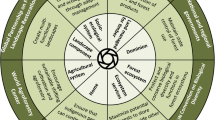Abstract
Few disputes in the annals of US environmentalism enjoy the pedigree of the conservation-preservation debate. Yet, although many scholars have written extensively on the meaning and history of conservation and preservation in American environmental thought and practice, the resonance of these concepts outside the academic literature has not been sufficiently examined. Given the significance of the ideals of conservation and preservation in the justification of environmental policy and management, however, we believe that a more detailed analysis of the real-world use and understanding of these ideas is needed. In this paper, we describe the results of a qualitative, semantic study of the concepts of conservation and preservation undertaken in the context of the Chattahoochee National Forest (CNF), located in northern Georgia (USA). Thirty in-depth interviews were conducted with scientists and north Georgia residents either interested or involved in the future management of the forest. Respondents were asked to define conservation and preservation in their own words and to indicate which approach they felt was more appropriate for the management of the CNF. Qualitative content analysis was used to elicit a set of recurring themes for each foundational concept. Taken together, these themes help to flesh out the meaning of conservation and preservation for citizens and scientists today, and illustrate the evolving nature of two of the more significant and venerable ideas animating US environmental policy and management.
Similar content being viewed by others
References
Andrews R. N. L. (1999) Managing the Environment, Managing Ourselves: A History of American Environmental Policy Yale University Press, New Haven, CT
Bengston D. N., T. J. Webb, D. P. Fan (2004) Shifting Forest Value Orientations in the United States, 1980–2001: A Computer Content Analysis. Environmental Values 13:373–392
Berg B. L. (1998) Qualitative Research Methods for the Social Sciences. Allyn and Bacon, Boston
Botkin D. B. (1992) Discordant Harmonies: A New Ecology for the Twenty-First Century. Oxford University Press, Oxford, UK
Brown P., S. Zavestoski, B. Mayer, S. McCormick, P. S. Webster (2002) Policy Issues in Environmental Health Disputes. Annals of the American Academy of Political and Social Science 584:175–202
Brulle R. J. (2000) Agency, Democracy, and Nature: The US Environmental Movement from a Critical Theory Perspective. MIT Press, Cambridge, MA
Clary D. A. (1986) Timber and the Forest Service University Press of Kansas, Lawrence, KS
Corley E. A. (2004) U.S. National Forest Policies Regarding Logging: A Case Study of Citizens and Scientists in the Chattahoochee National Forest. Policy Studies 25:103–120
Cortner H. J. and M. A. Moote (1999) The Politics of Ecosystem Management. Island Press, Washington, DC
Costanza R., B. G. Norton, B. D. Haskell (eds.) (1992) Ecosystem Health: New Goals for Environmental Management. Island Press, Washington, DC
Devall B. and G. Sessions (1985) Deep Ecology: Living as if Nature Mattered. Gibbs Smith, Salt Lake City, UT
Elands B. H. M. and K. F. Wiersum (2001) Forestry and Rural Development in Europe: An Exploration of Socio-Political Discourses. Forest Policy and Economics 3:5–16
Flick U (1998) An Introduction to Qualitative Research. Sage Publications, Thousand Oaks, CA
Fox S. (1981) The American Conservation Movement: John Muir and His Legacy. The University of Wisconsin Press, Madison, WI
Hays S. P. (1959) Conservation and the Gospel of Efficiency: The Progressive Conservation Movement, 1890–1920. Harvard University Press, Cambridge, MA
Hirt P. W. (1994) A Conspiracy of Optimism: Management of the National Forests since World War Two. University of Nebraska Press, Lincoln, NE
Katz E. (1997) Nature as Subject: Human Obligation and Natural Community. Rowman & Littlefield, Inc, Lanham, MD
Kempton, W., J. S. Boster, and J. A. Hartley (1996) Environmental Values in American Culture MIT Press, Cambridge, MA new edn
Lee, J. (2003) A Call for Softer, Greener Language. The New York Times, Sunday March 2, p. A18
Luntz, F., The Environment: A Cleaner, Safer, Healthier America (2003). Available at http://www.ewg.org/briefings/luntzmemo/pdf/LuntzResearch_environment.pdf
Manning R. E., W. A. Valliere, B. A. Minteer (1999) Values, Ethics, and Attitudes Toward National Forest Management: An Empirical Study. Society and Natural Resources 12:421–439
Marshall C. and G. B. Rossman (1995) Designing Qualitative Research. Sage Publications, Thousand Oaks, CA
McCormick S., P. Brown, S. Zavestoski (2003) The Personal is Scientific, the Scientific is Political: The Public Paradigm of the Environmental Breast Cancer Movement. Sociological Forum 18:545–576
Meffe G. K. and C. R. Carroll (eds.) (1997) Principles of Conservation Biology. Sinauer Associates, Sunderland, MA
Meine C. (2004) Correction Lines: Essays on Land, Leopold, and Conservation. Island Press, Washington, DC
Miller C. (2001) Gifford Pinchot and the Making of Modern Environmentalism. Island Press, Washington, DC
Morgan M. G., B. Fischhoff, A. Bostrom, C. J. Atman (2002) Risk Communication: A Mental Models Approach. Cambridge University Press, Cambridge, UK
Nash R. F. (2001) Wilderness and the American Mind. 4th edn Yale University Press, New Haven, CT
Norton B. G. (1986) Conservation and Preservation: A Conceptual Rehabilitation. Environmental Ethics 8:195–220
Norton B. G. (1991) Toward Unity Among Environmentalists. Oxford University Press, New York
Oates J. F. (1999) Myth and Reality in the Rain Forest: How Conservation Strategies Are Failing in West Africa. University of California Press, Berkeley, CA
Paehlke R. (1989) Environmentalism and the Future of Progressive Politics. Yale University Press, New Haven, CT
Passmore J. (1974) Man’s Responsibility for Nature: Ecological Problems and Western Traditions. Charles Scribner’s Sons, New York
Pickett S. T. A. and R. S. Ostfeld (1995) The Shifting Paradigm in Ecology. In: R. L. Knight, S. H. Bates (eds) A New Century for Natural Resources Management. Island Press, Washington, DC pp. 261–277
Rapport D., R. Costanza, P. R. Epstein, C. Gaudet, R. Levins (1998) Ecosystem Health. Blackwell Science, Malden, MA
Reiger J. F. (2001) American Sportsmen and the Origins of Conservation. 3rd edn Oregon State University Press, Corvallis, OR
Righter R. W. (2005) The Battle over Hetch Hetchy: America’s Most Controversial Dam and the Birth of Modern Environmentalism. Oxford University Press, Oxford, UK
Robinson J. G. (1993) The Limits to Caring: Sustainable Living and the Loss of Biodiversity. Conservation Biology 7:20–28
Rolston H. III (1994) Conserving Natural Value. Columbia University Press, New York
Seabrook, C. (2001), “Off-Road Vehicles Trample Protected Georgia Forest,” The Atlanta Journal-Constitution March 1, p. D3
Seabrook, C., “New Forest Plan, Same Old Dispute: Environmentalists Fear ‚Healthy’ Logging Rules,” The Atlanta Journal-Constitution February 9 (2004), p.␣A1
Seidman I. (1998) Interviewing as Qualitative Research. 2nd edn Teacher’s College Press, New York
Steen, H. K. (2004) The US Forest Service: A History, University of Washington Press, Seattle, WA, centennial ed
Steel B, P. List, B. Shindler (1994) Conflicting Values about Federal Forests: A Comparison of National and Oregon Publics. Society and Natural Resources 7:137–153
Sudman S. and N. M. Bradburn (1982) Asking Questions: A Practical Guide to Questionnaire Design. Jossey-Bass, San Francisco, CA
Takacs D. (1996) The Idea of Biodiversity: Philosophies of Paradise. Johns Hopkins University Press, Baltimore, MD
Terborgh J. (1999) Requiem for Nature. Island Press, Washington, DC
Tindall D. B. (2003) Social Values and the Contingent Nature of Public Opinion and Attitudes about Forests. Forestry Chronicle 79:692–705
Vining J. and E. Tyler (1999) Values, Emotions and Desired Outcomes Reflected in Public Responses to Forest Management Plans. Human Ecology Review 6:21–34
Wear, D. N. and J. G. Greis, Southern Forest Resource Assessment. General Technical Report, Srs-53. US Department of Agriculture, Forest Service, Southern Research Station, Asheville, NC, 2002
Weiss R. S. (1994) Learning from Strangers: The Art and Method of Qualitative Interview Studies. The Free Press, New York
Williams M. (1989) Americans and Their Forests: A Historical Geography. Cambridge University Press, Cambridge, UK
Wilson E. O. (2002) The Future of Life. Knopf, New York
Wu J. and O. L. Loucks (1995) From Balance-of-Nature to Hierarchical Patch Dynamics: A Paradigm Shift in Ecology. Quarterly Review of Biology 70:439–466
Zavestoski S., P. Brown, M. Linder, S. McCormick, B. Mayer (2002) Science, Policy, Activism, and War: Defining the Health of Gulf War Veterans. Science Technology & Human Values 27:171–205
Author information
Authors and Affiliations
Corresponding author
Rights and permissions
About this article
Cite this article
Minteer, B.A., Corley, E.A. Conservation or Preservation? A Qualitative Study of the Conceptual Foundations of Natural Resource Management. J Agric Environ Ethics 20, 307–333 (2007). https://doi.org/10.1007/s10806-007-9040-2
Accepted:
Published:
Issue Date:
DOI: https://doi.org/10.1007/s10806-007-9040-2




